- Home
- C. Robert Cargill
Dreams and Shadows
Dreams and Shadows Read online
DEDICATION
FOR JESSICA,
SHE IS EVERYTHING
ACKNOWLEDGMENTS
The circumstances of this book getting from my hands into yours would not have come about without the efforts and support of a number of incredible people to whom I owe debts I feel I can never truly repay. They are wonderful people, one and all, and I hope, over the years, to find some way to settle our balance.
For Harry Knowles, who tossed me blindly into the sea to let me sink or swim, who often tossed me to the wolves to toughen me up, and who tossed me a rope when I needed it most. For Brian Keene, who asked me why I wasn’t doing this and told me that I could.
For all my readers over the years, everyone who has ever sought out my articles, written a letter or tweeted a tweet, for good or for ill (but mostly for the good). For all the editors over the years, too numerous to name, who hired me, poached me, or all around coached me. And for every person who ever fired me from a job or drove me to quit, reminding me what I really wanted to do.
For Paul Gandersman for all the coffee and for helping me find the book’s pacing; Ari Marmell for all the coffee and for helping me find the book’s structure; Jason Murphy for the scotch and helping me find the courage; Patricia Knowles for slapping Harry every now and again and letting me know I was on the right track; Luke Mullen for being the guy you can call for a favor no matter what the hour and no doubt will at some point help me bury a body. Their early notes all proved invaluable.
For the trickster Diana Gill, who Mr. Miyagi’d me into writing a better book than she found, and the entire team at Voyager: Shawn Nicholls, Dana Trombley, Will Hinton, Adam Johnson, Jesse Edwards, and Pam Spengler-Jaffee. For Simon Spanton, whose enthusiasm proved to be a beacon on the darker, harder nights. For Peter McGuigan, a rock star of an agent who once showed me more swagger in two weeks than I’ve seen out of most people in a lifetime, Stephanie Abou, and the outstanding team at Foundry. For my manager, David McIlvain, whose advice always clears the static, and to his confidant, Mac Dewey, who was an early believer.
For Scott Derrickson, my writing partner, my friend, and the guy who held the door open for me. He read this before anyone else, made suggestions before anyone else, and believed in this before anyone else. And I am all the better for it. We also make movies.
And for Jessica, who loves her writer, whose writer loves her more than breath, and who loved this story so much she demanded I write it down. She met a boy, she made him a man, and she never let him give up. For all that, this book is truly hers, because without her, none of the people listed above would have ever seen it. And neither would you.
And for the tireless efforts of Deputy So-and-So of the local police department, without whose research this book wouldn’t be possible.
CONTENTS
Dedication
Acknowledgments
Book One
Chapter One
Chapter Two
Chapter Three
Chapter Four
Chapter Five
Chapter Six
Chapter Seven
Chapter Eight
Chapter Nine
Chapter Ten
Chapter Eleven
Chapter Twelve
Chapter Thirteen
Chapter Fourteen
Chapter Fifteen
Chapter Sixteen
Chapter Seventeen
Chapter Eighteen
Chapter Nineteen
Chapter Twenty
Chapter Twenty-one
Chapter Twenty-two
Chapter Twenty-three
Chapter Twenty-four
Book Two
Chapter Twenty-five
Chapter Twenty-six
Chapter Twenty-seven
Chapter Twenty-eight
Chapter Twenty-nine
Chapter Thirty
Chapter Thirty-one
Chapter Thirty-two
Chapter Thirty-three
Chapter Thirty-four
Chapter Thirty-five
Chapter Thirty-six
Chapter Thirty-seven
Chapter Thirty-eight
Chapter Thirty-nine
Chapter Forty
Chapter Forty-one
Chapter Forty-two
Chapter Forty-three
Chapter Forty-four
Chapter Forty-five
Chapter Forty-six
Chapter Forty-seven
Chapter Forty-eight
Epilogue
About the Author
Credits
Copyright
About the Publisher
BOOK ONE
CHAPTER ONE
THE BEAST THAT ABSCONDS IN THE NIGHT
Once upon a time, there were two people who fell very much in love. They met in a high school library, peeking over tenth-grade French books, his eyes sneaking up from a rather dense untranslated passage, hers waiting perched behind a pair of horn-rimmed glasses. He was a sucker for horn-rimmed glasses. Hearts thundered. Breaths shortened. Stomachs swarmed with butterflies. She smiled and his world stopped.
He stammered, he sputtered, trying to smile back, failing in a train wreck of lips sneering back over teeth. And when his head slumped forward into his book, she giggled, for she knew that he was hers.
From the first words they spoke, they rarely spent a silent moment together. Each shared a passion for conversation—one that drove most around them mad—and it was never hard for them to find something to talk about. Their first date led from a movie theater to the Dairy Queen, on to a slow walk home, talking at length about every aspect of the film—from Ewan the dreamy Scottish actor to the scene in which someone dove into a toilet. He reached down, took her by the hand, each finger tingling as they brushed against her milky white teenage skin. Their gazes locked, tingles spreading from their fingertips, across their hands, up the backs of their necks, down their spines, ending at a curl in their toes.
That’s when he felt it. His fingers intertwined with hers; he could feel her trembling like a scared kitten. While he’d noticed it earlier, he hadn’t really thought much of it, thinking that she was just cold, a frail leaf shaking in the breeze of the ICE-COLD AIR-CONDITIONING advertised in block letters on the outside wall of the single-screen theater. No. She was nervous; she was scared of screwing this up. And he smiled, for he knew that she was his.
It was a perfect first kiss. He pulled her tight, kissing her as deeply and passionately as he knew how. Years later they would both laugh at the two stupid kids trying their first hand at necking, but in that moment—in each other’s arms—it was bliss. Over time they’d get it. And years later on a hot, humid day in April, they stood before a courtyard full of their family and friends, formally announcing to the world, “Till death do us part.” And they meant it. Every word.
And with that he took her into his arms, kissing her as deeply and as passionately as he knew how. This time he got it right. Then the preacher announced them to the world. Jared and Tiffany Thatcher.
While they had never lived very far out in the sticks, neither expected to end up downtown in a condominium high-rise built for aspiring yuppies and college kids with rich parents—on the seventeenth floor, with a view that looked out over the lake, onto the southern, hipper part
of town. It was expensive, especially with a baby on the way, but worth it. They were buying into the cliché, becoming a bedtime story for little girls, proof that dreams do, in fact, come true, that someday your prince will come, and everything else that goes with that.
They didn’t mind being a cliché or a bedtime story. Not one bit.
It was a Sunday on which their first and only child was born. He was strong, healthy, and had all the right numbers of fingers and toes. “A perfect specimen of the Thatcher genes,” as Jared put it. They had excelled at making a perfect baby; his name, on the other hand, had proved to be a bit of a hang-up. They’d beaten themselves silly trying to think of something clever, something charming, something that perfectly expressed the love they shared. But nothing came. And as the nurse approached them with the birth certificate, they sat huddled together with their beautiful, swaddling-wrapped baby boy, Jared waving her off, asking for a few minutes more.
“Can you believe it?” he asked his wife. “How did we get here?”
They gazed in wonder at their son, lost in memories of that first kiss. That night. That movie. And it hit them. “Ewan,” they both said at once. Their eyes locked, Jared taking his wife into his arms, kissing her as deeply and passionately as he knew how. It was perfect. It said everything. Ewan. The boy who would change their lives forever.
Ewan Thatcher never cried, he never wailed, he only cooed. And depending on the tone, pitch, and warble, Tiffany knew whether he was hungry, needed changing, or just wanted to be held. He loved to be held, and Tiffany never wanted to put him down. “You’re gonna spoil that kid,” Jared would say, trying to hide his beaming smile. “No one gets to spend more time in your arms than me.”
“You’re the spoiled one,” Tiffany snarked back playfully. “You had your time. It’s his turn now.”
It was an uncommonly beautiful evening the night that Tiffany would last set eyes upon her son. All the windows in the house were open, a slight breeze brushing in past the curtains, tickling the skin with butterfly kisses. She thought nothing of the open windows; they were on the seventeenth floor and Ewan could barely roll over by himself.
Tiffany had just put Ewan back down after a late feeding, humming an off-key tune to coax him back to sleep.
And if she were listening, rather than humming, she would have heard the faint, distant sound of skittering claws across polished concrete.
Just outside her window, clinging to the underside of the balcony, was a writhing mass of brown, bulbous flesh—a silently snarling beast with a misshapen head and an uncommonly large brow resting above tiny, jaundiced, bloodshot eyes. Its balding head gripped slight patches of graying hair, wisps desperately combed over concealing the wrinkled flesh beneath. Muscles bulged out in odd places, beset by dripping flab.
Its giant monkey-like arms gripped the edge of the balcony as it writhed in agony at the tuneless sound escaping betwixt Tiffany’s lips.
For Dithers, a Bendith Y Mamau, Tiffany’s song was the last screeching wail of a strangled animal; the dismal, shrill sound of a pack of harpies swooping down upon their prey. She meant well, but that didn’t stop him wincing painfully at each misstruck note. Dithers flailed against the wall, praying the veil wouldn’t fail him and leave him exposed so high up. He held firm, thankful that he was dangling above another balcony and wouldn’t have far to fall were she to begin slaughtering a song he actually knew.
He’d heard bad singers in his life, but this mother hadn’t a chord in her throat that could strike so much as a single note, let alone string together a melody. She deserved what she had coming to her; she deserved it for what she was doing to music. Reaching back, Dithers checked the squirming leather sack dangling from a strap slung over his shoulder. All he needed was for that suckling beast to return to her bed so he could perform the single most important task of his life.
In his cradle, Ewan drifted into an infant’s slumber, the notes of his mother’s tune drifting in and out of his formless dreams. Tiffany smiled, knowing she had a good two or three hours more before he would gurgle and coo again. She lingered for a moment, marveling at the wonder in the crib. Her hand stroked the top of his head and he fussed—just a little—before settling back. Her song ended, and she retreated swiftly back to bed, stepping lightly so her footsteps wouldn’t wake him.
Dithers breathed deep, squinched tight his eyes, saying a silent prayer. In one fluid motion, he swung back, kicking off the bottom of the balcony, slinging himself around—up and over the bars—before landing graceful as a cat. He glanced around—no one to see him, not so much as a pigeon or an angel this high up tonight. He’d have liked to smile, but the job wasn’t over, too much still to go wrong.
Focus. Eyes on the crib.
He darted in through the open door, brushing past the gossamer curtains, giving a cursory glance to ensure he wasn’t seen. No one must know. No one. But the building was new, its otherworldly inhabitants yet to properly stake their claim to the nooks and crannies of every dark corner. All the better. He didn’t want a fight. He just wanted to grab the kid and go. With the kick of his foot, he was perched upon the crib’s railing. He took a brief moment—nothing more than an instant—to think about what he was doing, running over the checklist one more time.
Then he reached into his sack with one hand, scooping up baby Ewan with the other.
In one rehearsed motion, he swapped the contents of his bag for the child in the crib. Then he was off, vaulting over the balcony, soaring blindly out into the night below without pausing to admire his own handiwork.
Dithers sailed seventeen stories down, his outstretched arm catching the trunk of a tree, swinging him, spiraling around, leaving a candy-cane scratch in the bark. His feet had barely touched the ground before he tore off into a full run, making his way behind a building, out into the darkness. In the sack behind him, enjoying the bumpy ride in a cushioned bag, a groggy Ewan smiled and cooed.
He would never see his mother again.
Seventeen stories up, the curtains still rustled. Beyond them, in the crib, a child looking remarkably like Ewan lay in identical pajamas. Spattered with vomit and feces, reeking of the thick smell of swamp rot, the child fussed, uncomfortable on the cozy mattress. There wasn’t the slightest hint of glamour in the air, not a bit of mountain laurel on the breeze. It was about as awful and antiseptic a place as he’d ever been. And so he began to scream.
Tiffany shot up out of bed as if it were on fire, tearing away the covers, running full speed toward the baby’s room. Something was wrong. Very wrong. For a baby who never made a noise louder than a cough to wail like that, it had to be a matter of life and death. She careened around the corner, stockinged feet slipping on the hardwood floor, arms flailing like a windmill to keep her balance, as she slid to a stop next to Ewan’s crib. The changeling shrieked and it cried and it screamed its little head off, the sound pushing in on her inner ear as if she were twenty feet underwater.
Reaching in to pick up her child, she stopped, her hands hovering above the baby. This isn’t right, she thought. “What’s wrong, sweetie?” she asked. “Tell Mommy what you need.” But the changeling continued its hellish squeal. Tiffany peered closer, her eyes trying to make out its features in the dark as she reached in, once again attempting to pick up her child.
Then the smell hit her, a rotting, fetid stench like week-old garbage littered with animal corpses, left to sweat in the humid Texas heat. She shuddered, covering her nose with the back of her hand to keep from gagging.
Looking again, she caught a glimpse of a single, sharp tooth. Is he teething? Already? Cautiously, she stuck a finger in his mouth, running it along bleeding gums. The little fiend bit down, sinking a single, jagged, cavity-ridden tooth into his new mother’s flesh.
She yanked back her hand, yelping, sticking the bloody finger in her mouth. The screaming stopped and the changeling opened his eyes, gazing upon Tiffany
for the first time.
She could see the creature’s yellow, catlike eyes—black slits where the pupils should be—glowing in the dark of his crib. And she screamed, terrified of the monster staring back at her. The changeling smiled and—hearing the nourishing fright in his mother’s voice—let out a soothed coo.
Tiffany couldn’t explain it; she couldn’t find the words. Every time she opened her mouth, the story falling out seemed implausible, unbelievable even to her. With the baby wailing in the other room, Jared stared at his wife with a look she’d never seen before. He’d been in the room, examined Ewan a dozen times himself. The baby was fine. Clearly upset, but fine. There were no jagged teeth. No glowing yellow eyes. There was no monster in that crib. But something was wrong.
“It wasn’t a dream,” she said bitterly. “I know what I saw.”
He reassured her, putting a sympathetic, worried hand on her arm. “I know you do, baby. I believe you.” But he didn’t.
“I want to take him to the doctor,” she demanded.
“We’ll take him. But . . .”
“But don’t tell him what I told you?”
“I didn’t say that,” said Jared.
“You didn’t have to.”
THE PEDIATRICIAN HAD kind eyes when she burst into tears in front of him. Of course, having only met her a few times before, he had no idea how out of character her hysterics were. And when she finally felt at ease enough to let her secret out, he remained unflappable, even smiling a little. He’d heard all this before; it was never good and rarely ended well.

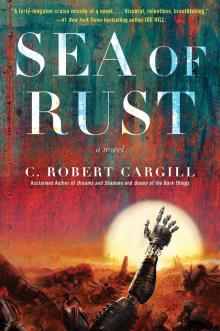 Sea of Rust
Sea of Rust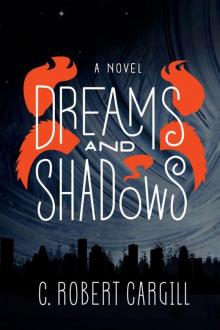 Dreams and Shadows: A Novel
Dreams and Shadows: A Novel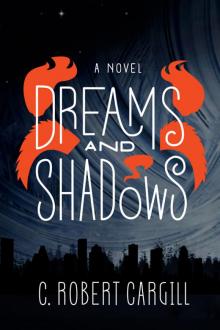 Dreams and Shadows
Dreams and Shadows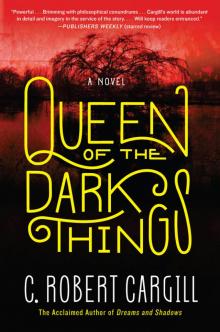 Queen of the Dark Things
Queen of the Dark Things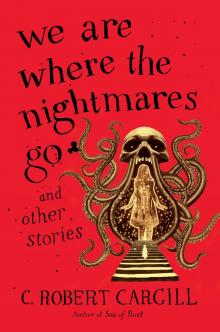 We Are Where the Nightmares Go and Other Stories
We Are Where the Nightmares Go and Other Stories